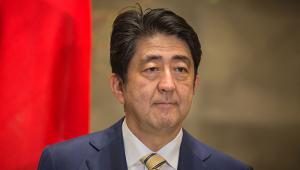So-called ‘Abenomics’ have shocked markets with a range of unconventional policies, including the introduction of negative interest rates for some banks.
But Abe’s strategy has so far bourne little fruit. Japan only narrowly avoided a recession in the first quarter of this year and today the IMF said that despite Abenomics’ initial successes, a “more substantial, coordinated policy upgrade” is needed in order to achieve its ambitious goals.
According to a statement from the fund, “under current policies, the high nominal growth goal, the inflation target, and the primary budget surplus objective all remain out of reach within the timeframe set by the authorities.”
It noted that the government has acknowledged the risk of falling short and has acted to ease monetary and fiscal policies, but added the outlook “remains weak” and the timeframe for targets should be extended.
The fund anticipated that Japan’s economy will grow at 0.5% in 2016 before slowing again next year, to 0.3%. Inflation is expected to remain well below the Bank of Japan’s 2% target, at 0.2% this year and 0.6% in the next.
Policy “shortcomings” are a key impediment to the country’s economic recovery, the fund continued, highlighting an unfortunate 2014 choice to raise consumption tax that ended up sending the country into a recession.
It said the “stop-go nature” of fiscal policy in Japan has left policies without any credible medium-term anchors and generated uncertainty.
Reforms had also failed to address some of the nation’s structural obstacles to growth, including low confidence in economic prospects related to an ageing and shrinking population, labour market inflexibility and weak demand.
While the fund said recent policy actions are working to put Abenomics back on track, the strategy needs to be “reloaded”.
It recommended policies to ensure profitable companies raise wages and labour market reforms, as well as a “credible fiscal consolidation” plan that fosters fiscal sustainability.
One move would be to ease plans for another consumption tax hike, which was scheduled to go ahead next year but was delayed to 2019 in the face of weak results in the first quarter.
“Given the low potential growth, and the need to avoid leaning excessively against the Bank of Japan’s easing policies, a gradual increase in the consumption tax toward at least 15%, e.g. by 0.5% or 1% per year over regular intervals, would strike the right balance between supporting growth and achieving fiscal sustainability in the long run,” the fund said.
“Starting increases soon and replacing the currently planned 2019 hike with such a pre-announced, gradual path would enhance the credibility of long-run fiscal adjustment, reduce uncertainty for consumers and avoid large inter-temporal shifts in spending.”
The fund also recommended more labour market reforms and the strengthening of policy frameworks. This could be achieved by removing the reliance on optimistic growth assumptions, introducing rules to curb expenditure and a greater quantity of independent assessments of the outlook and budget projections.
“In the absence of a significant policy upgrade, policy space will be very limited and should be used sparingly,” the IMF stated.












